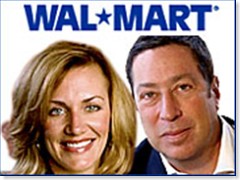Every day, the sudden departure of Wal-Mart marketing boss Julie Roehm is attracting more attention and is increasingly linked to her connection with Draft FCB, which she pushed to become Wal-Mart's agency of record in October.
Speculation suggests Roehm flouted Wal-Mart's strict corporate gratuities policy, which states no one who works for the company can accept any sort of gratuities from suppliers (even a cup of coffee). But the real damage was done when Draft FCB ran an ill-advised, tasteless, and remarkably uncreative Lion Awards advertisement featuring a real male and female lion having sex above a copy line that read "It's Good to Be on Top."
I won't post it here, but you can find a copy of the ad on ADFREAK. The ad is so poorly done and uninspired that one poster accused Adfreak's Tim Nudd of posting a fake. No doubt, Draft FCB wishes it was a fake, as one of its spokespeople has already said the ad was "a terrible mistake."
It's a terrible mistake because some inside Wal-Mart, those who were dissastified with the decision to hire Draft FCB, suddenly had good reason to second guess Roehm's big push. Not good for Draft FCB because Wal-Mart insiders are not the only ones looking to poke holes in Howard Draft's rise to the top of the industry after merging with Foote Cone & Belding (which was already struggling) last June.
As Lewis Lazare wrote in the Chicago Sun-Times, the merger date will "go down as one of the darkest moments in the history of an increasingly troubled ad industry, which, with each passing day, shows new and disturbing signs it has lost its way.”
He called Draft FCB Group depressingly real proof the American ad industry has been totally and tragically upended.
“It's a shame to think that an agency like Draft that was once the lowly tail on a big, healthy, creatively inspired canine has finally emerged as the powerhouse wagging the mangy mutt that is now the general consumer ad business,” he said.
Little did Lazare know that the tail he was writing about would be morphed into a lion within six months. An agency showing its not-so-wild side, after Wal-Mart gave the agency its $580 million account, only added to Roehm's streak of bad luck since joining Wal-Mart.
Last month, she made a questionable call on a press release from Wal-Mart about how a staffer of John Edwards, the former senator and presidential hopeful, inquired about getting a Sony Playstation on the same day that Edwards was having a media event in which he talked about how bad Wal-Mart is to its workers.
Summed: never underestimate the brand damage you can do with a single gratuitous awards program advertisement. A dark day indeed.
Speculation suggests Roehm flouted Wal-Mart's strict corporate gratuities policy, which states no one who works for the company can accept any sort of gratuities from suppliers (even a cup of coffee). But the real damage was done when Draft FCB ran an ill-advised, tasteless, and remarkably uncreative Lion Awards advertisement featuring a real male and female lion having sex above a copy line that read "It's Good to Be on Top."
I won't post it here, but you can find a copy of the ad on ADFREAK. The ad is so poorly done and uninspired that one poster accused Adfreak's Tim Nudd of posting a fake. No doubt, Draft FCB wishes it was a fake, as one of its spokespeople has already said the ad was "a terrible mistake."
It's a terrible mistake because some inside Wal-Mart, those who were dissastified with the decision to hire Draft FCB, suddenly had good reason to second guess Roehm's big push. Not good for Draft FCB because Wal-Mart insiders are not the only ones looking to poke holes in Howard Draft's rise to the top of the industry after merging with Foote Cone & Belding (which was already struggling) last June.
As Lewis Lazare wrote in the Chicago Sun-Times, the merger date will "go down as one of the darkest moments in the history of an increasingly troubled ad industry, which, with each passing day, shows new and disturbing signs it has lost its way.”
He called Draft FCB Group depressingly real proof the American ad industry has been totally and tragically upended.
“It's a shame to think that an agency like Draft that was once the lowly tail on a big, healthy, creatively inspired canine has finally emerged as the powerhouse wagging the mangy mutt that is now the general consumer ad business,” he said.
Little did Lazare know that the tail he was writing about would be morphed into a lion within six months. An agency showing its not-so-wild side, after Wal-Mart gave the agency its $580 million account, only added to Roehm's streak of bad luck since joining Wal-Mart.
Last month, she made a questionable call on a press release from Wal-Mart about how a staffer of John Edwards, the former senator and presidential hopeful, inquired about getting a Sony Playstation on the same day that Edwards was having a media event in which he talked about how bad Wal-Mart is to its workers.
Summed: never underestimate the brand damage you can do with a single gratuitous awards program advertisement. A dark day indeed.




















